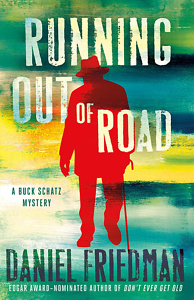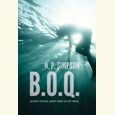Elder Appeal
Frail and failing, retired detective Buck Schatz defends lethal punishment for a serial killer he put away
When last we checked on author Daniel Friedman’s character Buck Schatz, we were hoping the cantankerous octogenarian and long-retired Memphis police detective would make it to his next decade — in spite of his significant medical issues, limited mobility, miserable outlook, and unwavering commitment to Lucky Strikes. Fortunately for fans of memorable mysteries and comic genius, Friedman has delivered the third book in the series, which, given that Schatz is now nearly 90, is aptly titled Running Out of Road.
 Life hasn’t been kind lately to the Jewish former cop who rose to significant rank in the Memphis police department in the 1950s, when some of his superiors were known Klansmen and anti-Semitism was widespread and pernicious. A full 40 years since his retirement, Schatz is so distracted by the manifestations of his decrepitude that there is nary a mention in this latest title of his bowel movements or fondness for Fox News, cherished parts of his days in books one and two.
Life hasn’t been kind lately to the Jewish former cop who rose to significant rank in the Memphis police department in the 1950s, when some of his superiors were known Klansmen and anti-Semitism was widespread and pernicious. A full 40 years since his retirement, Schatz is so distracted by the manifestations of his decrepitude that there is nary a mention in this latest title of his bowel movements or fondness for Fox News, cherished parts of his days in books one and two.
Instead, Schatz and his wife of 70 years, Rose, are spending their days shuffling between their Valhalla Estates retirement home and a dizzying array of doctors, including a cardiologist, gastroenterologist, audiologist, psychologist, and neurologist (the one Schatz calls “the dementia guy”), to name a few. Schatz needs the dementia guy for lots of reasons, but chiefly because he is constantly forgetting that Rose has just been diagnosed with cancer.
It becomes clear that the ailing couple will have to call on someone to help them make medical decisions for Rose, if and when she becomes incapacitated, because Schatz can’t seem to remember she’s sick. Their son Brian is dead, a loss from which Schatz has never fully recovered, so they call on their grandson Tequila, a recent law school graduate studying for the bar.
“It’s not that he’s incoherent, exactly,” Rose tells the neurologist about her husband. “He just forgets important things. … Medical things. But he remembers every ridiculous thing he hears on talk radio. He can’t shut up about that.”
“It’s not my fault the liberals are out to destroy this country,” Schatz shoots back, reaching for his Lucky Strikes.
Speaking of liberals, Carlos Watkins, host of the NPR-affiliated series American Justice, keeps calling Schatz to set up an interview about the case of convicted serial killer Chester March, scheduled to become the oldest person executed in the U.S. since the death penalty was reinstated in 1976, assuming his lawyer’s efforts to stay the lethal injection fail. It took Schatz 20 years (and beating some teeth out of the killer’s head during an interrogation) to put away the remorseless psychopath, who killed at least three women between 1953 and 1976: a black prostitute, his own wife, and, finally, his landlord, whom he tried to liquify in a vat of acid. Though the evidence against March was significant, Schatz’s Klan-friendly higher-ups weren’t energized by the murder of a black woman or the suspected killing of a wife whose body had yet to be found. But two decades on, Schatz eventually got his man.
 Tequila counsels his grandfather unequivocally against talking to the journalist, a transparent ideologue who “wants to give you a rope to see if you’re willing to hang yourself.” But, Schatz counters, “[Watkins] said his program is about race and class and the criminal justice system. If my witness hadn’t been a colored prostitute and I hadn’t been a Jew, Chester would have been convicted of murder in 1955, and he’d have gone to the electric chair decades ago.”
Tequila counsels his grandfather unequivocally against talking to the journalist, a transparent ideologue who “wants to give you a rope to see if you’re willing to hang yourself.” But, Schatz counters, “[Watkins] said his program is about race and class and the criminal justice system. If my witness hadn’t been a colored prostitute and I hadn’t been a Jew, Chester would have been convicted of murder in 1955, and he’d have gone to the electric chair decades ago.”
What ensues is Watkins’ unceasing pursuit of an interview with Schatz; a series of American Justice episodes that rely on a narrative of Chester March’s victimhood; and Tequila, Rose, and Buck embarking on a simultaneously heartbreaking and side-splitting road trip to Nashville to view what they hope will be March’s execution. And, of course, there’s hot chicken.
In Running Out of Road, Friedman, a Memphis native who is now an attorney in New York City, manages to tackle two inescapably dismal subjects with uncommon nimbleness: aging and the death penalty. He renders the helplessness and difficulty of waning life as sometimes humorous and other times hopelessly sad, like when Schatz explains how he used to wear cordovan oxfords, “shoes of a striver,” but now settles for slip-on canvas sneakers: “They tell you a story of resignation, a story of decline. They tell you about the stream of compromises that have steadily eroded my foundation and turned me into the rickety ruin I have become.”
At times throughout the narrative, Friedman seems to censure the familiar tendency of death penalty coverage to focus so much on the condemned that victims’ stories are forgotten. But just when the author’s point of view seems diagnosable, Friedman offers a persuasive and nuanced answer from the other side of the ideological aisle.
Friedman’s writing, as always, elevates the genre and exceeds all expectations of crime fiction. And like his other two books in the series — Don’t Ever Get Old (2012) and Don’t Ever Look Back (2014) —Running Out of Road contains plenty of playfulness in Schatz’s trademark wisecracking and surliness. But, as the title suggests, the book is also sobering, and not just because we’re losing Schatz to life’s indignities.

Liz Garrigan is the former editor of the Nashville Scene and Washington City Paper. She lives in Bangkok, Thailand.


